Wolfram Function Repository
Instant-use add-on functions for the Wolfram Language
Function Repository Resource:
Construct and aggregate subexpressions with descending and ascending operators
ResourceFunction["ExpressionTransform"][expr,f,g,n] successively applies f to expr up to level n, applying g to each subexpression and its result. | |
ResourceFunction["ExpressionTransform"][expr,f,g,n,h] applies g to h[expr] instead of expr. | |
ResourceFunction["ExpressionTransform"][expr,f,{g,g-1},n,h] applies g-1 at the last level and g at each inner level. | |
ResourceFunction["ExpressionTransform"][expr,{f0,f1,…},{g0,g1,…,g-1},n,h] applies the operators fi and gi at level i. | |
ResourceFunction["ExpressionTransform"][expr,<|i1→fi1,i2→fi2,…|>,<|j1→gj1,j2→gj2,…|>,n,h] applies the operators fi and gi at level i. |
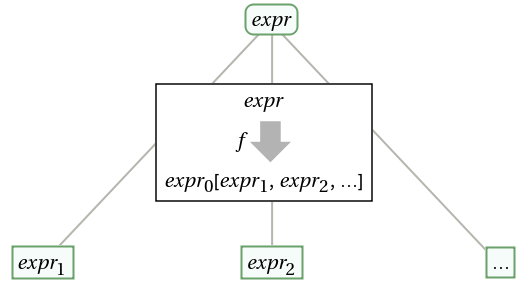
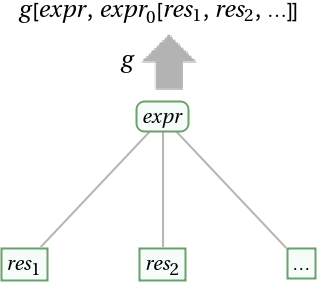
Nest a descending and an ascending operator twice:
| In[1]:= |
| Out[1]= |
Apply a descending and an ascending operator at successive levels:
| In[2]:= |
| Out[2]= |
Apply an ascending operator at the last level:
| In[3]:= |
| Out[3]= |
Construct and visualize a tree as subscripted data with highlighted leaves, adding frames around inner subtrees:
| In[4]:= |
| Out[4]= |  |
Apply descending operators to the values of an association:
| In[5]:= | ![ResourceFunction[
"ExpressionTransform"][1, <|"Even" -> 2 #, "Odd" -> 2 # + 1|> &, {Framed@*Subscript, Highlighted}, 2]](https://www.wolframcloud.com/obj/resourcesystem/images/e98/e987e166-1926-4172-b662-3bfa6869e956/2a01c6a38738aaa7.png) |
| Out[5]= |  |
Apply descending operators to the arguments of an arbitrary expression:
| In[6]:= |
| Out[6]= | 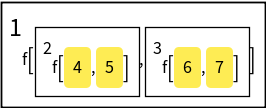 |
Apply successive operators at successive levels:
| In[7]:= |
| In[8]:= |
| Out[8]= |
| In[9]:= |
| Out[9]= |
| In[10]:= |
| Out[10]= |
Apply a descending operator f at level 1 of an array:
| In[11]:= |
| Out[11]= |
Apply Total afterward as an ascending operator at level 0:
| In[12]:= |
| Out[12]= |
Apply Total first as a descending operator at level 0 instead:
| In[13]:= |
| Out[13]= |
Apply a descending operator:
| In[14]:= |
| Out[14]= |
Apply an ascending operator:
| In[15]:= |
| Out[15]= |
Apply operators at multiple levels:
| In[16]:= |
| Out[16]= |
Apply an ascending operator at the last level:
| In[17]:= |
| Out[17]= |
Apply successive operators at successive levels:
| In[18]:= |
| Out[18]= |
Apply ascending operators to a property of the expression:
| In[19]:= |
| Out[19]= |
Atomic expressions:
| In[20]:= |
| Out[20]= |
Normal expressions:
| In[21]:= |
| Out[21]= |
| In[22]:= |
| Out[22]= |
Specify the number of additional levels:
| In[23]:= |
| Out[23]= |
Repeatedly apply descending operators until no more levels are added:
| In[24]:= |
| Out[24]= |
Apply operators without evaluating intermediate results:
| In[25]:= |
| Out[25]= |
Apply subsequent operators to the values of an association:
| In[26]:= |
| Out[26]= |
Count the number of subtrees at each level of a tree:
| In[33]:= |
| In[34]:= | ![g[{_, {counts___}}, {res___}] :=
Total[PadRight[{{counts, 1}, res}]];
gl[{_, {counts___}}] :=
{counts, 1};](https://www.wolframcloud.com/obj/resourcesystem/images/e98/e987e166-1926-4172-b662-3bfa6869e956/0a7d097a477b96c5.png) |
| In[35]:= | ![ResourceFunction["ExpressionTransform"][{\!\(\*
GraphicsBox[
NamespaceBox["Trees",
DynamicModuleBox[{Typeset`tree = HoldComplete[
Tree[Null, {
Tree[Null, None],
Tree[Null, {
Tree[Null, None]}],
Tree[Null, {
Tree[Null, {
Tree[Null, None]}]}]}]]},
NamespaceBox[{
{Hue[0.6, 0.7, 0.5], Opacity[0.7], Arrowheads[Medium],
{RGBColor[0.6, 0.5882352941176471, 0.5529411764705883], AbsoluteThickness[1], LineBox[{{0.8660254037844387, 2.5352693433792695`}, {0., 1.6901795622528462`}}]},
{RGBColor[0.6, 0.5882352941176471, 0.5529411764705883], AbsoluteThickness[1], LineBox[{{0.8660254037844387, 2.5352693433792695`}, {
0.8660254037844387, 1.6901795622528462`}}]},
{RGBColor[0.6, 0.5882352941176471, 0.5529411764705883], AbsoluteThickness[1], LineBox[{{0.8660254037844387, 2.5352693433792695`}, {
1.7320508075688774`, 1.6901795622528462`}}]},
{RGBColor[0.6, 0.5882352941176471, 0.5529411764705883], AbsoluteThickness[1], LineBox[{{0.8660254037844387, 1.6901795622528462`}, {
0.8660254037844387, 0.8450897811264231}}]},
{RGBColor[0.6, 0.5882352941176471, 0.5529411764705883], AbsoluteThickness[1], LineBox[{{1.7320508075688774`, 1.6901795622528462`}, {
1.7320508075688774`, 0.8450897811264231}}]},
{RGBColor[0.6, 0.5882352941176471, 0.5529411764705883], AbsoluteThickness[1], LineBox[{{1.7320508075688774`, 0.8450897811264231}, {
1.7320508075688774`, 0.}}]}},
{Hue[0.6, 0.2, 0.8], EdgeForm[{GrayLevel[0], Opacity[0.7]}],
TagBox[InsetBox[
FrameBox["",
Background->Directive[
RGBColor[0.9607843137254902, 0.9882352941176471, 0.9764705882352941]],
BaseStyle->GrayLevel[0],
FrameStyle->Directive[
RGBColor[0.4196078431372549, 0.6313725490196078, 0.4196078431372549], AbsoluteThickness[1],
Opacity[1]],
ImageSize->{1, 1},
RoundingRadius->4,
StripOnInput->False], {0.8660254037844387, 2.5352693433792695}],
"DynamicName",
BoxID -> "VertexID$1"],
TagBox[InsetBox[
FrameBox["",
Background->Directive[
RGBColor[0.9607843137254902, 0.9882352941176471, 0.9764705882352941]],
BaseStyle->GrayLevel[0],
FrameStyle->Directive[
RGBColor[0.4196078431372549, 0.6313725490196078, 0.4196078431372549], AbsoluteThickness[1],
Opacity[1]],
ImageSize->{1, 1},
RoundingRadius->0,
StripOnInput->False], {0., 1.6901795622528462}],
"DynamicName",
BoxID -> "VertexID$2"],
TagBox[InsetBox[
FrameBox["",
Background->Directive[
RGBColor[0.9607843137254902, 0.9882352941176471, 0.9764705882352941]],
BaseStyle->GrayLevel[0],
FrameStyle->Directive[
RGBColor[0.4196078431372549, 0.6313725490196078, 0.4196078431372549], AbsoluteThickness[1],
Opacity[1]],
ImageSize->{1, 1},
RoundingRadius->4,
StripOnInput->False], {0.8660254037844387, 1.6901795622528462}],
"DynamicName",
BoxID -> "VertexID$3"],
TagBox[InsetBox[
FrameBox["",
Background->Directive[
RGBColor[0.9607843137254902, 0.9882352941176471, 0.9764705882352941]],
BaseStyle->GrayLevel[0],
FrameStyle->Directive[
RGBColor[0.4196078431372549, 0.6313725490196078, 0.4196078431372549], AbsoluteThickness[1],
Opacity[1]],
ImageSize->{1, 1},
RoundingRadius->0,
StripOnInput->False], {0.8660254037844387, 0.8450897811264231}],
"DynamicName",
BoxID -> "VertexID$4"],
TagBox[InsetBox[
FrameBox["",
Background->Directive[
RGBColor[0.9607843137254902, 0.9882352941176471, 0.9764705882352941]],
BaseStyle->GrayLevel[0],
FrameStyle->Directive[
RGBColor[0.4196078431372549, 0.6313725490196078, 0.4196078431372549], AbsoluteThickness[1],
Opacity[1]],
ImageSize->{1, 1},
RoundingRadius->4,
StripOnInput->False], {1.7320508075688774, 1.6901795622528462}],
"DynamicName",
BoxID -> "VertexID$5"],
TagBox[InsetBox[
FrameBox["",
Background->Directive[
RGBColor[0.9607843137254902, 0.9882352941176471, 0.9764705882352941]],
BaseStyle->GrayLevel[0],
FrameStyle->Directive[
RGBColor[0.4196078431372549, 0.6313725490196078, 0.4196078431372549], AbsoluteThickness[1],
Opacity[1]],
ImageSize->{1, 1},
RoundingRadius->4,
StripOnInput->False], {1.7320508075688774, 0.8450897811264231}],
"DynamicName",
BoxID -> "VertexID$6"],
TagBox[InsetBox[
FrameBox["",
Background->Directive[
RGBColor[0.9607843137254902, 0.9882352941176471, 0.9764705882352941]],
BaseStyle->GrayLevel[0],
FrameStyle->Directive[
RGBColor[0.4196078431372549, 0.6313725490196078, 0.4196078431372549], AbsoluteThickness[1],
Opacity[1]],
ImageSize->{1, 1},
RoundingRadius->0,
StripOnInput->False], {1.7320508075688774, 0.}],
"DynamicName",
BoxID -> "VertexID$7"]}}]]],
AlignmentPoint->Center,
Axes->False,
AxesLabel->None,
AxesOrigin->Automatic,
AxesStyle->{},
Background->None,
BaseStyle->{},
BaselinePosition->Automatic,
ContentSelectable->Automatic,
DefaultBaseStyle->"TreeGraphics",
Epilog->{},
FormatType->StandardForm,
Frame->False,
FrameLabel->FormBox["False", StandardForm],
FrameStyle->{},
FrameTicks->None,
FrameTicksStyle->{},
GridLines->None,
GridLinesStyle->{},
ImageMargins->0.,
ImagePadding->All,
ImageSize->{48.073101543142556`, Automatic},
LabelStyle->{},
PlotLabel->None,
PlotRange->All,
PlotRangeClipping->False,
PlotRangePadding->Automatic,
PlotRegion->Automatic,
Prolog->{},
RotateLabel->True,
Ticks->Automatic,
TicksStyle->{}]\), {}}, f, {g, gl}, Infinity]](https://www.wolframcloud.com/obj/resourcesystem/images/e98/e987e166-1926-4172-b662-3bfa6869e956/247eb27abceb6309.png) |
| Out[35]= |
Create a tree of terms in a linear recurrence:
| In[36]:= |
| Out[36]= | 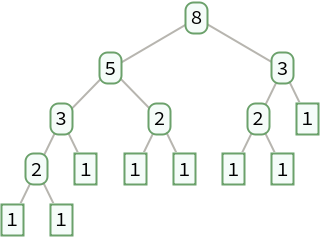 |
NestList gives a list of the results of successive applications of an operator f to an expression:
| In[37]:= |
| Out[37]= |
ExpressionTransform successively applies descending operators f to an expression before subsequent operators are applied at deeper levels:
| In[38]:= |
| Out[38]= |
ExpressionTransform applies subsequent operators to each part of an expression:
| In[39]:= |
| Out[39]= |
Fold gives the result of successively applying a binary operator g to the elements of a list:
| In[40]:= |
| Out[40]= |
ExpressionTransform successively applies ascending binary operators g to an expression and the result after all subsequent operators have been applied at deeper levels:
| In[41]:= |
| Out[41]= |
ExpressionTransform applies subsequent operators to each part of an expression:
| In[42]:= |
| Out[42]= |
ExpressionTransform applies subsequent operators to each part of an expression:
| In[43]:= |
| Out[43]= |
| In[44]:= |
| Out[44]= |
NestList constructs a list by successively applying an operation f to an expression:
| In[45]:= |
| Out[45]= |
Fold successively applies a binary operation g to the elements of a list:
| In[46]:= |
| Out[46]= |
ExpressionTransform constructs an expression from the top-down by successively applying descending operators f and applying ascending binary operators g to subexpressions from the bottom-up in a single traversal:
| In[47]:= |
| Out[47]= |
TreeFold[g,NestTree[f,Tree[expr,None],n,h]] is generally equivalent to ExpressionTransform[expr,f,g,n,h]:
| In[48]:= |
| Out[48]= | 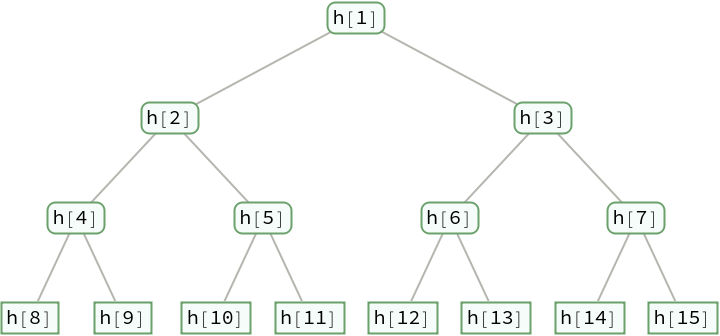 |
| In[49]:= |
| Out[49]= |
| In[50]:= |
| Out[50]= |
MapAll[g,expr] is generally equivalent to ExpressionTransform[expr,{},g[#2]&,g},Infinity]:
| In[51]:= |
| Out[51]= |
| In[52]:= |
| Out[52]= |  |
| In[53]:= |
| Out[53]= |
In ExpressionTransform, the ascending operator g takes the original expression as an argument for inner levels:
| In[54]:= |
| Out[54]= |  |
Apply Total as a descending operator:
| In[55]:= |
| Out[55]= |
Apply Total as an ascending operator:
| In[56]:= |
| Out[56]= |
Query applies either a descending operator or an ascending operator at each level:
| In[57]:= | 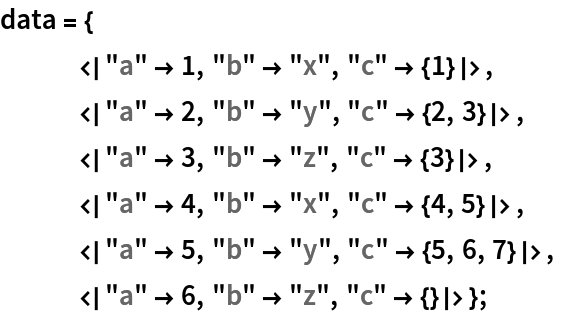 |
| In[58]:= |
| Out[58]= |
This can also be done with ExpressionTransform:
| In[59]:= |
| Out[59]= |
ExpressionTransform applies both a descending and an ascending operator at each level:
| In[60]:= | ![ResourceFunction[
"ExpressionTransform"][data, {EchoLabel[f0], EchoLabel[f1]@*Extract[{{Key["a"]}}], EchoLabel[f2]}, {Echo[g0[#2], g0] &, Echo[First[#2], g1] &, EchoLabel[g]@*g}, 3]](https://www.wolframcloud.com/obj/resourcesystem/images/e98/e987e166-1926-4172-b662-3bfa6869e956/5a1f8d8a6ccd8a90.png) |
| Out[60]= |
ExpressionTransform[expr,f,g,0] gives expr:
| In[61]:= |
| Out[61]= |
ExpressionTransform[expr,f,{…,g-1},0] applies the operator g-1 to expr instead:
| In[62]:= |
| Out[62]= |
ExpressionTransform[expr,f,g] gives expr if f[expr] gives an atomic expression:
| In[63]:= |
| Out[63]= |
ExpressionTransform[expr,f,{…,g-1}] applies the operator g-1 to expr instead:
| In[64]:= |
| Out[64]= |
ExpressionTransform[expr,f,g] applies the operator g if f[expr] gives a normal expression:
| In[65]:= |
| Out[65]= |
This is true even if f[expr] gives an expression with no arguments:
| In[66]:= |
| Out[66]= |
ExpressionTransform successively applies a descending operator f until the maximum level is reached or f returns an expression with no arguments:
| In[67]:= |
| Out[67]= |
ExpressionTransform[expr,f,g,n,h] gives the result of applying g to both h[expr] and expr0[res1,res2,…], where f[expr] gives expr0[expr1,expr2,…] and ExpressionTransform[expri,f,g,n-1,h] gives resi:
| In[68]:= |
| In[69]:= |
| Out[69]= |
| In[70]:= |
| Out[70]= |
ExpressionTransform[expr,{f0,f1,…},{g0,g1,…,g-1},n,h] gives the result of applying g0 to both h[expr] and expr0[res1,res2,…], where f0[expr] gives expr0[expr1,expr2,…] and ExpressionTransform[expri,{f1,…},{g1,…,g-1},n-1,h] gives resi:
| In[71]:= |
| Out[71]= |
| In[72]:= |
| Out[72]= |
ExpressionTransform[expr,{f},g,n,h] is equivalent to ExpressionTransform[expr,f,g,n,h]:
| In[73]:= |
| Out[73]= |
| In[74]:= |
| Out[74]= |
ExpressionTransform[expr,{},g,n,h] is equivalent to ExpressionTransform[Identity,g,n,h]:
| In[75]:= |
| Out[75]= |
| In[76]:= |
| Out[76]= |
ExpressionTransform[expr,f,g,n,h] is equivalent to ExpressionTransform[expr,f,{g,Identity},n,h]:
| In[77]:= |
| Out[77]= |
| In[78]:= |
| Out[78]= |
ExpressionTransform[expr,f,{g},n,h] is equivalent to ExpressionTransform[expr,f,{#2&,g},n,h]:
| In[79]:= |
| Out[79]= |
| In[80]:= |
| Out[80]= |
ExpressionTransform[expr,f,{},n,h] is equivalent to ExpressionTransform[expr,f,{#2&,Identity},n,h]:
| In[81]:= |
| Out[81]= |
| In[82]:= |
| Out[82]= |
ExpressionTransform[expr,{},{},Infinity] is generally equivalent to expr:
| In[83]:= |
| Out[83]= |
Construct the 3rd-step Sierpiński triangle:
| In[84]:= | ![ResourceFunction["ExpressionTransform"][CirclePoints@3, Array[1/2 (KroneckerDelta[#1, #3] + KroneckerDelta[#2, #3]) &, {3, 3,
3}] . # &, {RegionUnion @@ #2 &, Region@*Triangle}, 3]](https://www.wolframcloud.com/obj/resourcesystem/images/e98/e987e166-1926-4172-b662-3bfa6869e956/57c556d256a78c74.png) |
| Out[84]= | 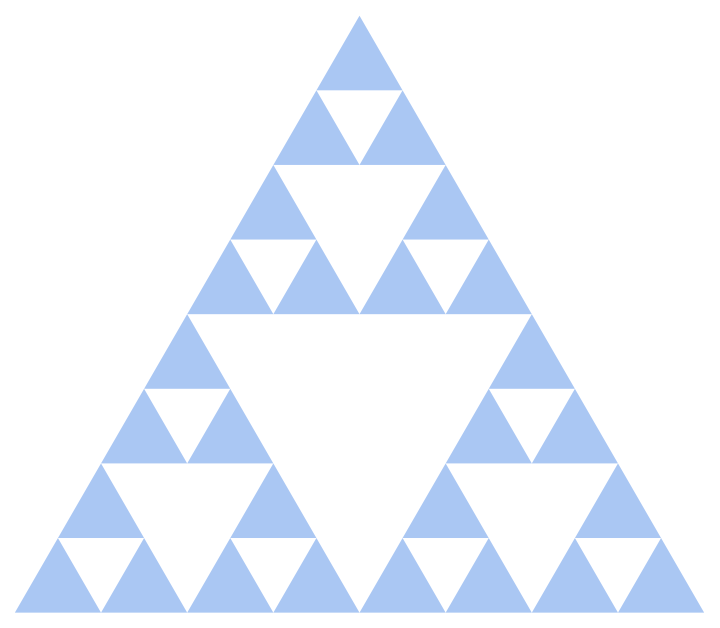 |
Construct the 3rd-step Cantor set:
| In[85]:= | ![ResourceFunction["ExpressionTransform"][{0, 1}, Array[1/3 (2 KroneckerDelta[#1, #3] + KroneckerDelta[#2, #3]) &, {2, 2, 2}] . # &, {RegionUnion @@ #2 &, Region@*Interval}, 3]](https://www.wolframcloud.com/obj/resourcesystem/images/e98/e987e166-1926-4172-b662-3bfa6869e956/2d5f77ab1d3bfffe.png) |
| Out[85]= |
Define functions to compute branches of a fractal:
| In[86]:= |
| In[87]:= |
| In[88]:= |
Construct a graphical image of the lines connecting the constructed points in the 0th- through 7th steps:
| In[89]:= |
| Out[89]= |
| In[90]:= |
| Out[90]= |  |
Define a function that divides a list with two or more elements into a left half and a right half:
| In[91]:= |
Define a function that merges two sorted lists giving a sorted list:
| In[92]:= |
| In[93]:= | ![zip[{es___}, {l_, ls___}, {r_, rs___}] := If[l <= r, zip[{es, l}, {ls}, {r, rs}], zip[{es, r}, {l, ls}, {rs}]]
zip[{es___}, {ls___}, {}] := {es, ls}
zip[{es___}, {}, {rs___}] := {es, rs}](https://www.wolframcloud.com/obj/resourcesystem/images/e98/e987e166-1926-4172-b662-3bfa6869e956/36fd817fcbd3b82e.png) |
Perform a merge sort on a random list:
| In[94]:= |
| Out[94]= |
| In[95]:= |
| Out[95]= |
Define a function that divides a non-empty list into the list of elements less than or equal to a pivot element and the list of elements greater than the pivot element:
| In[96]:= |
| In[97]:= |
Define a function that merges the results of sorting these lists:
| In[98]:= |
Perform a quick sort on a random list:
| In[99]:= |
| Out[99]= |
| In[100]:= |
| Out[100]= |
Wolfram Language 13.0 (December 2021) or above
This work is licensed under a Creative Commons Attribution 4.0 International License